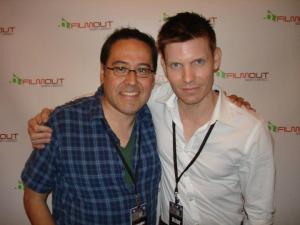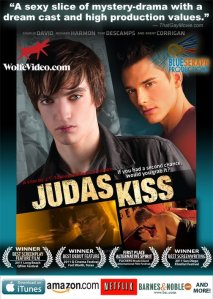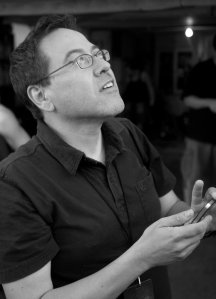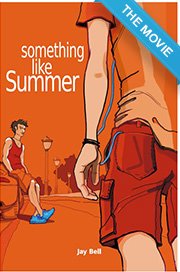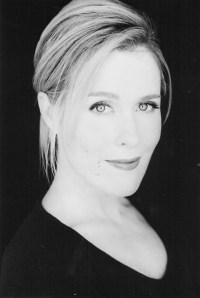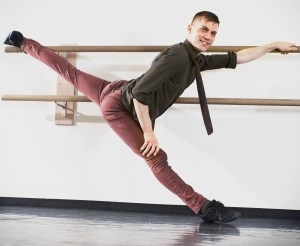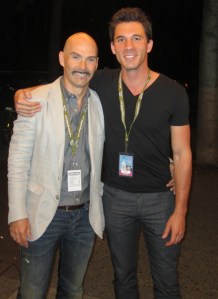Rob Williams isn’t just a filmmaker, he and his partner Rodney Johnson have created Guest House Films, which distributes movies primarily for the gay audience. I met Rob after they acquired  Fatelink’s film “Winner Takes All” for their “Black Briefs” collection, which went on to hit number one on TLAGay.com‘s sales chart for LGBT titles. Rob talked with us about his new film “The Men Next Door” and about the process of making a film from incorporating to casting to finding the right distributor. And, yep, he answers that question. What should you do with the first $2,500 you raise?
Fatelink’s film “Winner Takes All” for their “Black Briefs” collection, which went on to hit number one on TLAGay.com‘s sales chart for LGBT titles. Rob talked with us about his new film “The Men Next Door” and about the process of making a film from incorporating to casting to finding the right distributor. And, yep, he answers that question. What should you do with the first $2,500 you raise?
Hunter: You’ve gotten to the promised land of indie filmmaking and by that I mean, you haven’t just directed one film. You’ve directed six! How has the craft and business of filmmaking changed between your first feature and “The Men Next Door“?
Rob: For me, filmmaking has become easier for two reasons – (1) I’ve gained experience on each film, which lets me better anticipate problems and hopefully be more creative with my work; and (2) changing technology makes for easier camera purchase or rental, software availability, distribution options, etc. And we have spent a lot of time working on building Guest House Films since we shot our first film, and while the business end of it never gets easier, perseverance definitely pays off.
Hunter: I’m beginning to get a little suspicious of aspiring filmmakers who tell me that the only reason they haven’t made a movie is they have no one to finance it. What advice can you give filmmakers to get over that hurdle? Or, with digital technology, is that just an excuse at this point?
Rob: I think the combination of digital technology and crowd-sourced fundraising (such as Kickstarter and IndieGoGo) make it easier than ever to make a movie without any excuses. You can buy or rent a high-quality digital camera for very little money, find actors and crew members willing to work for little or no wages (though I always recommend paying every member of your cast and crew), edit the movie on your computer, and release it online. That’s where the real indie filmmakers are turning these days, and with a little imagination and a lot of hard work, anyone can get their movie made. Now, whether that’s a good thing or a bad thing is another question!
Hunter: Are you functioning as your own movie studio in terms of owning equipment, editing facilities, in-house graphics? How much stuff do you rent/farm out versus keep in-house? And if an indie filmmakers has $1500-$2500 to invest in equipment or software, what would you advise as the first purchase?
Rob: We have always believed in doing what we can do well, and then farming out the rest. For us, that means hiring a good director of photography, editor, music composer, graphic designer and all of the other positions that make a movie stand out, and allowing us to focus on the writing, directing, producing and distribution. But we’ve never really invested in equipment for one reason – technology changes incredibly fast. That amazing HD camera that costs $2,500 today might be completely obsolete in a year or two. My advice to an indie filmmaker with that amount of start-up capital would be to find a good attorney and use that money to incorporate their business and get the basic legal paperwork done so that they can move forward with building their brand.
Hunter: How do you keep the casting process streamlined and efficient? Casting is one of those things that a lot of indie filmmakers don’t budget for – they figure it’s two days borrowing an office and buying some doughnuts for the guy helping you video the auditions. But if the casting process takes a month…well…that gets expesnsive, right? Time is money. How do you keep on track?
Rob: Casting should never be an expensive process. We keep track of actors we like, and if there is an opportunity to work with them, we’ll try to bring them in. It’s much easier to find an actor you like and who is good, and approach them directly, than to hold a huge cattle call. But if we have to, we post on online casting sites, carefully comb through submissions and keep the audition process to a minimum. And if that doesn’t work, we ask fellow filmmakers – referrals are the absolute best way to find good actors. If another director or producer can vouch for someone’s talent and work ethic, that goes a long way with me.
Hunter: Of course, as an old school romantic, it seems totally awesome that you make movies with your partner Rodney at your side. Is it fun to be able to develop as a filmmaker with someone you care about so much?
Rob: Absolutely! It’s great that we have been able to start our company together, work together to make it grow, work on each film together and share in the rewards. We are both passionate about filmmaking and dedicated to producing the best films we can.
Hunter: You and I have talked a little bit about the evolution of LGBT film. Are you seeing any trends in how the films are maturing? Or are they maturing at all? Should a young LGBT filmmaker still make his “coming out” story if that’s what moves him? Or are certain stories deemed too “passe” and others “hip”?
Rob: It’s tempting to say that we’re moving into a “post-gay” world of filmmaking, where the characters’ sexual orientation is irrelevant. But that’s just not true, especially for people like me who want to make gay-themed films. Hollywood films may incorporate more and more gay characters in a nonchalant way, but indie gay films are made for the gay audience. Our viewers want to see their lives reflected onscreen (or perhaps see what they wish their lives would be). I wouldn’t ever tell a filmmaker to stay away from any particular genre, because we need filmmakers to tell stories that are important to them, that move them and that could resonate with their viewers. Sure, coming-out stories have been done to death, but if someone has a fresh take on it, they should go for it. Good storytelling transcends genre.
Hunter: You’ve now branched into distribution with the “Black Briefs” and “Blue Briefs” collections of gay shorts. (And we’re especially grateful since it includes our own “Winner Takes All”). How did this bridge to distribution happen for Guest House Films and why did you feel it was important? Is being a distributor more or less fun than the producing?
Rob: After dealing with distributors for our first four films, Guest House Films made the decision to get into distribution with our fifth feature film, “Role/Play,” taking advantage of the relationships we had built over the years and the increasing ease with which filmmakers can get their own products out to the public. After the success of “Role/Play,” we saw an opportunity to get other people’s films out there, particularly short films. There are so many amazing gay-themed short films produced every year, and so few ever get seen outside of film festivals, and we’re glad we can help filmmakers get their work seen. It’s a lot of work, but it’s also very gratifying to see these great films reach a wider audience.
Hunter: I know and many others in the community know your reputation for honestly caring about LGBT filmmakers and being honest in business, which is amazing in a field rife with piracy and “creative accounting.” What are the biggest ethical pitfalls that young filmmakers face and what are some strategies for staying true to yourself?

Rob’s collection of dark short films landed on the top of TLAGay.com’s sales chart in 2012.
Rob: The biggest pitfall young or first-time filmmakers encounter is accepting the first offer they receive or not doing their research about distributors. Before signing anything, filmmakers should ask around and find out exactly what they’re getting into. If they want to stay true to themselves and to what they want to do, they should focus on developing good scripts and finding good actors, and then simply make the movies they want to make. Don’t let anyone tell you what you should or should not make – create the movies that mean something to you, and that will make it resonate with others.
Hunter: Thanks for your time, Rob. I think it’s exciting that you’re going all the way with DIY and distributing product yourselves, making more money on your own films and providing a platform for newer artists to gain exposure and a financial foothold in the market. 🙂
—
Hunter Lee Hughes is a filmmaker and actor living and working in Los Angeles and the founder of Fatelink. His current feature film Guys Reading Poems is touring film festivals and this blog is dedicated to the process of making his second feature film, “Inside-Out, Outside-In.” If you enjoy the blog, please support our team by following us on Facebook, Twitter (@Fatelink) or Instagram (@Fatelink).




